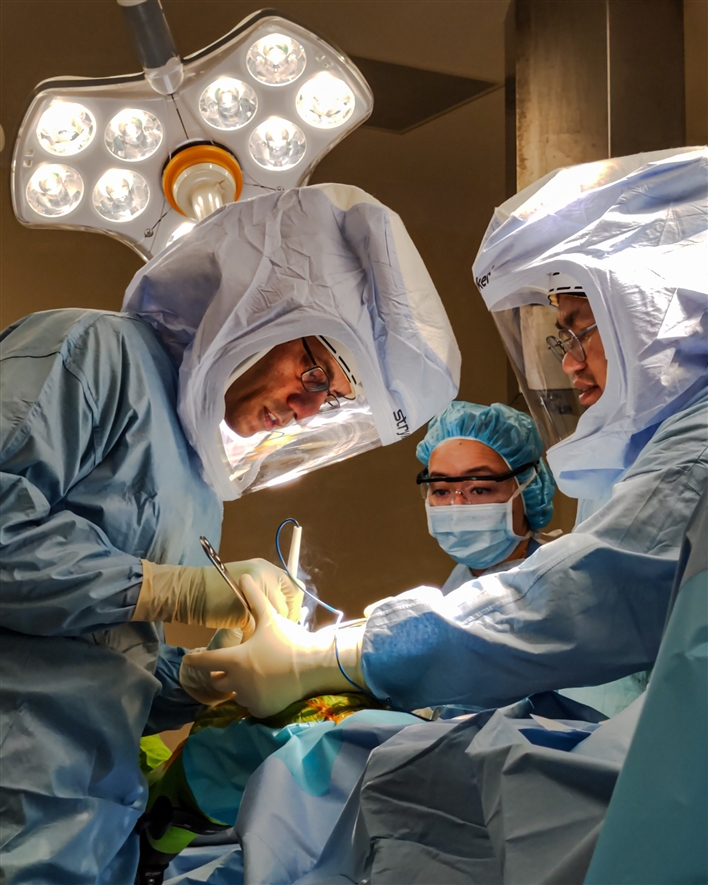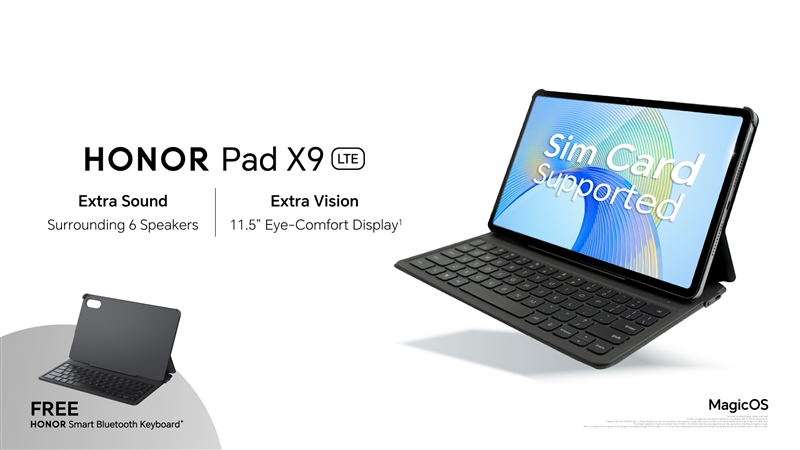
Subang Jaya Medical Centre (SJMC) has achieved a significant milestone in Total Knee Replacement (TKR) surgery, being the first hospital in Malaysia to offer TKR surgery as a daycare service, utilising the advanced MAKO Robotic-Arm Assisted System. This advancement in orthopaedic care represents a notable step forward in medical care and highlights SJMC’s dedication to utilising advanced technology and providing patient-centred services.
“I would like to express my sincere appreciation to the team. Their combined expertise and unwavering dedication have been instrumental in making this possible. When integrated with robot-assisted surgery, this revolutionary procedure not only elevates the overall patient experience but also leads to a significant reduction in complication rates,” shared Dato’ Dr Siva Kumar Ariaretnam, Consultant Orthopaedic Surgeon at SJMC, who is also the team lead.
The procedure is supported by a home-based rehabilitation programme which is commenced the morning after surgery, offered through SJMC’s in-house home-care nursing service; Home Connect Service, to ensure that patients receive the highest quality of care while recovering at home.
From performing the surgery to managing pain effectively and during the recovery phase, the entire process is managed efficiently by the team of experts at SJMC.
Shorter Recovery Time at Home
TKR is a common surgical procedure performed on patients with degenerated knees caused by medical conditions like osteoarthritis, rheumatoid arthritis, or post-traumatic arthritis resulting from an injury. In such cases, TKR surgery involves resurfacing the damaged joint, restoring mobility and alleviating pain for the patient.
“Although daycare TKR is new in Malaysia, it is practised by a growing number of surgeons in the United States and parts of Europe. There is a worldwide movement in all fields of surgery towards enhanced recovery after surgery (ERAS), and daycare surgery is merely an end product of ERAS,” Dato’ Dr Siva shared.
The first case of daycare TKR utilising the MAKO Robotic-Arm Assisted System in Malaysia was performed on a patient in her 60s, who sought treatment for severe knee osteoarthritis. She had her right TKR done three months prior and she was discharged the day after surgery. This time, the patient requested if she could have her left TKR done on a day-surgery basis.
Now, she embarked on another TKR for her left knee, utilising robot-assisted surgery. The combination of her determination and advanced medical techniques provided the patient with the best possible care and outcome for her left knee replacement.
“Apart from cost-efficiency, the advantages include the reduction in cross-contamination and infections with implant surgeries especially with ICU (Intensive Care Unit) and prolonged hospital stays,” Dato’ Dr Siva noted.
The Advantages of Orthopaedic Advancements
A muscle-sparing approach is utilised in surgery to enable early mobilisation, minimising strength loss and pain. Pain management is accomplished through multimodal analgesia and anaesthesia techniques. Additionally, blood conservation and reduction of bleeding are made possible by surgical and pharmacological methods using innovative wound closure techniques and medications.
“For over a decade, most patients undergo routine ERAS treatment. Daycare surgery is only performed on patients’ request and is a culmination of years of experience. The pandemic prompted our first daycare case due to patient concerns about overnight stays. Currently, the standard is a two- to three-day stay, unless patients request to go home on the day of surgery,” Dato’ Dr Siva explained.
“Not all patients are suitable for or have a conducive home environment for an early return home. However, patients can benefit from ERAS to facilitate them to be independent and to function on their own sooner regardless of the time of discharge,” he added.
For a patient to go home on the day of surgery, the surgical team needs to identify if the patient and their family fulfil certain stringent criteria:
- Pain needs to be managed using oral medications alone.
- Patients need to be able to get up and walk on their own with a walking aid and bend their knees to at least 90 degrees.
- Stair climbing is desired but not a necessary criterion to fulfil.
- There should not be any risk of bleeding or wound complications, or the need for blood transfusion.
- Patients should have emptied their bladder prior to returning home. Patients should not suffer nausea or vomiting while at home.
This accomplishment is the result of a collaborative effort involving the surgeon, anaesthetist, nursing, and physiotherapy team. Additionally, close coordination with the HomeConnect team, who conducts follow-up visits to the patient’s home the day after surgery, plays a pivotal role. A short video is available on SJMC’s social media channels https://youtu.be/VqEAqW2a-gs.
Harnessing the Power of Robot-Assisted Surgery
MAKO Robotic-Arm Assisted System is one of the biggest developments in joint replacement surgery. It is an innovative solution for many suffering from painful arthritis of the knee or hip. The technology is a game-changer, bringing new levels of precision and customisation to the joint replacement process.
MAKO uses a 3D CT-based planning software so surgeons can know more about the patient’s anatomy to create a personalised joint replacement surgical plan. It enables surgeons to execute their surgical plans more accurately, protects soft tissue and ligaments from damage, and offers a less painful experience than conventional joint replacement. To date, SJMC has performed more than 130 joint replacement surgeries using MAKO, since early 2022.
This article is written by Subang Jaya Medical Centre (SJMC)












